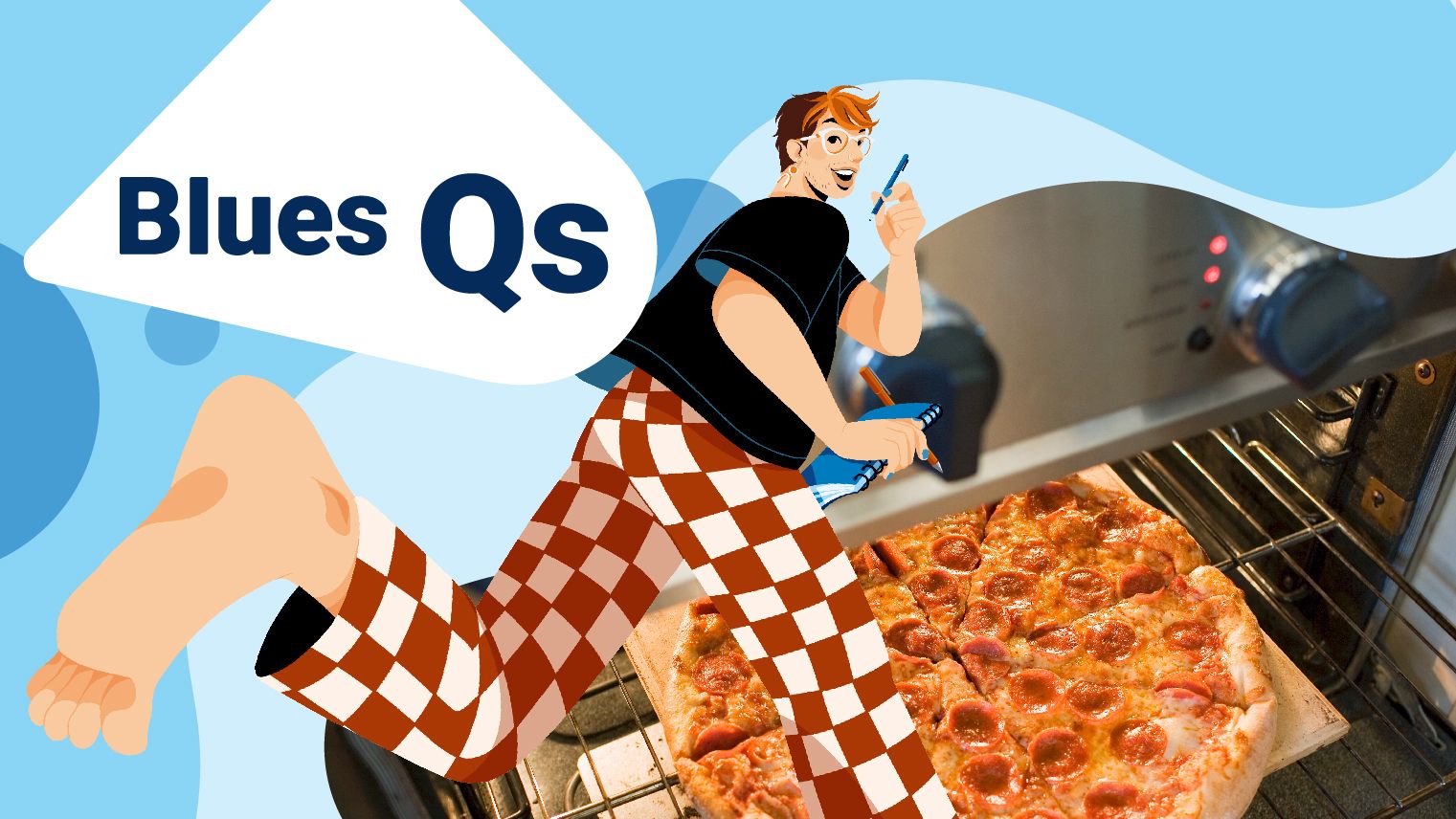Blues Qs: How Do I Stop ‘Emotional Eating’ When I’m Depressed?
September 20, 2022
Content created for the Bezzy community and sponsored by our partners. Learn More

Collage design by Ryan Hamsher
Blues Qs is an advice column covering all things clinical depression, written by Bezzy Depression community guide Sam Dylan Finch. Diagnosed with clinical depression over a decade ago, Sam has seen it all — from medication mishaps to grippy sock “staycations.” He’s here to help you navigate your own depression journey with a little humor and a lot of heart.
Reader, as I write this very column, I’m enjoying some french fries from McDonald’s that I’ve been craving for the last week. And let me tell you something… I have zero regrets.
Call it “emotional eating” if you want, but here’s what I know to be true: When you live with depression, keeping yourself alive is a victory. And if you do it with delicious french fries? I say, more power to you.
That, of course, is probably not what you wanted to hear in this column. Because we live in a society that labels food “good” and “bad,” and makes us feel terrible for choosing anything that could be remotely “bad.”
You probably want advice to stop eating “bad things” so that you’ll feel less guilty when you eat. But I don’t actually think what you’re doing is worth feeling guilty about.
Keeping yourself alive when depression has a hold on you? That’s amazing. Eating foods that comfort you? Such a smart coping tool.
Let’s start by releasing some of the guilt over that — because giving your body fuel, whatever that fuel may be, is a morally neutral act.
You aren’t a bad person for eating french fries, and you’re not a good person for eating broccoli instead. Food is just food at the end of the day, and obsessing over every little thing you eat isn’t exactly healthy, either.
Next, let me share with you something that might surprise you: You probably need to eat more.
Why? There is emerging evidence that binge eating or “overeating” can be caused by restriction, or not eating enough.
Why is this? Think about early humans and the ways in which we evolved to survive. Our bodies are hardwired to ensure we don’t starve — that is, after all, the greatest threat to our survival. So much so that our hormones actually respond to restriction by prompting us to eat more. A lot more.
Dietitian Rachael Hartley, RD, LD, explains: “One of the ways your body protects you is by ramping up hunger hormones in response to restriction. Ghrelin, the main hunger hormone… stays elevated when you’re undernourished, even after a normal sized meal… while leptin, the fullness hormone, is suppressed. Your body is trying to signal, via hormones, for you to eat more food.”
In other words, when you aren’t eating enough, your body floods you with signals to eat more, and makes it hard to tell when you’re full. It does this because when you restrict caloric intake, your body doesn’t know the difference between, say, a low calorie diet and you actually starving.
So, why do I bring this up at all?
Chances are, if you’re binge eating or “overeating” in the evenings, it might be because you aren’t eating enough, especially earlier in the day.
This makes sense, because depression tends to mess with our appetite. You might find that you simply aren’t hungry during the day, until suddenly in the evening, your hunger signals come online and you’re devouring a pint of ice cream in the blink of an eye.
If you really want my advice for how to stop ‘emotional eating,’ here it is: Eat more food.
I’m talking three meals and a few snacks per day. Not just in the evening, but throughout your day. If you have a tendency to forget to eat, set reminders on your phone. If you’re not “feeling” hungry? Yup, you still need to eat.
Here’s some more science if you don’t believe me: After periods of prolonged restriction — meaning, periods of time in which you are undernourished — your brain is actually neurologically altered.
The brain circuits in charge of hunger and fullness become altered, making it difficult to know when we’re hungry or full. This is why it’s so important to eat consistently, so that the parts of our brains and bodies that regulate hunger will work properly.
Otherwise, you’ll be stuck in a cycle of undereating and “overeating” (which is probably just your body trying to compensate for what you didn’t eat before) as your body and brain responds to restriction.
If you continue to find it difficult to eat consistently throughout the day, I would recommend reaching out to a dietitian or nutritionist and a mental health clinician who specializes in disordered eating. Eating disorders co-occur with depression quite often, and struggling to eat and binge eating are both signs that you could be dealing with an eating disorder.
In short? Please enjoy your food and enjoy it often. Your body needs fuel, especially when you’re depressed.
You deserve to enjoy your food, without assigning a moral value to it or obsessing about its contents.
Depression robs us of so many joys. If you find comfort in french fries, like I do, by all means, get the french fries. Just make sure that you’re eating consistently and enough, so your body has a steady source of fuel and can regulate itself accordingly.
You may even find that by eating consistently, your mood improves, too. We call it “hangry” for a reason.
Medically reviewed on September 20, 2022
2 Sources


Like the story? React, bookmark, or share below:
Have thoughts or suggestions about this article? Email us at article-feedback@bezzy.com.
About the author